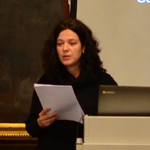Euroacademia Conferences
 Europe Inside-Out: Europe and Europeanness Exposed to Plural Observers (9th Edition) April 24 - 25, 2020
Europe Inside-Out: Europe and Europeanness Exposed to Plural Observers (9th Edition) April 24 - 25, 2020 Identities and Identifications: Politicized Uses of Collective Identities (9th Edition) June 12 - 13, 2020
Identities and Identifications: Politicized Uses of Collective Identities (9th Edition) June 12 - 13, 2020 8th Forum of Critical Studies: Asking Big Questions Again January 24 - 25, 2020
8th Forum of Critical Studies: Asking Big Questions Again January 24 - 25, 2020 Re-Inventing Eastern Europe (7th Edition) December 13 - 14, 2019
Re-Inventing Eastern Europe (7th Edition) December 13 - 14, 2019 The European Union and the Politicization of Europe (8th Edition) October 25 - 26, 2019
The European Union and the Politicization of Europe (8th Edition) October 25 - 26, 2019 Identities and Identifications: Politicized Uses of Collective Identities (8th Edition) June 28 - 29, 2019
Identities and Identifications: Politicized Uses of Collective Identities (8th Edition) June 28 - 29, 2019 The European Union and the Politicization of Europe (7th Edition) January 25 - 26, 2019
The European Union and the Politicization of Europe (7th Edition) January 25 - 26, 2019 7th Forum of Critical Studies: Asking Big Questions Again November 23 - 24, 2018
7th Forum of Critical Studies: Asking Big Questions Again November 23 - 24, 2018 Europe Inside-Out: Europe and Europeanness Exposed to Plural Observers (8th Edition) September 28 - 30, 2018
Europe Inside-Out: Europe and Europeanness Exposed to Plural Observers (8th Edition) September 28 - 30, 2018 Identities and Identifications: Politicized Uses of Collective Identities (7th Edition) June 14 - 15, 2018
Identities and Identifications: Politicized Uses of Collective Identities (7th Edition) June 14 - 15, 2018
Collaboration, Cultural Diplomacy and Conflicting Representations in Contemporary Art Biennials
-
-

-
Presentation speakers
- Federica Martini Schellenberg , Musée Cantonal des Beaux-Arts, Lausanne, Switzerland
Abstract:
Since the first Venice Biennale in 1895 to the contemporary art system, biennales have increasingly provided a venue to reflect on the politics of representation of international art and, more recently, on the challenges brought about by globalization.
Today, almost two hundred biennales are active in the world. They thus provide a privileged observation point on how cultural and national identities are represented in official culture; on the dialectic centre/margins in the geography of artistic production; on the dynamics of inclusion/exclusion in the international artistic scene; and on the «ethnophilia» of the contemporary art system.
In the European context, the fall of the Berlin wall has authorized the creation of new forms of international exhibitions and biennials, such as the Manifesta, started in 1996 as an itinerant, pan-European perennial exhibition based on a principle of collaboration and not on competition between nations, as in the original Venetian model.
Focusing on three exhibition experiences – Robert Filliou’s Biennial of Peace (Amsterdam, 1985), On taking a normal situation and retranslating it into overlapping and multiple readings of conditions past and present (1993, Antwerpen), the 2006 unrealized Manifesta of Cyprus – the intervention will reflect on different models of international collaboration and cultural diplomacy in European identity exhibitions. -
Related Presentations

Delayed EU Enlargement in the Western Balkans
- Blerim Reka

















